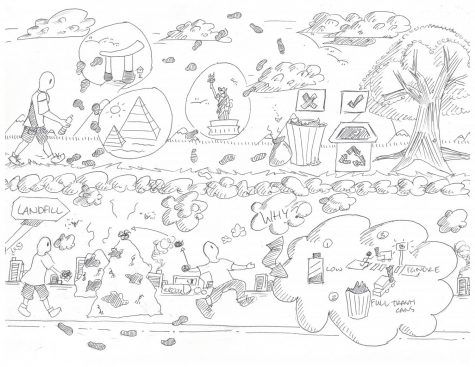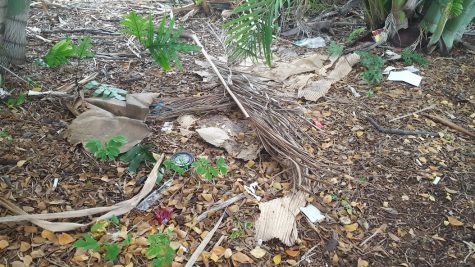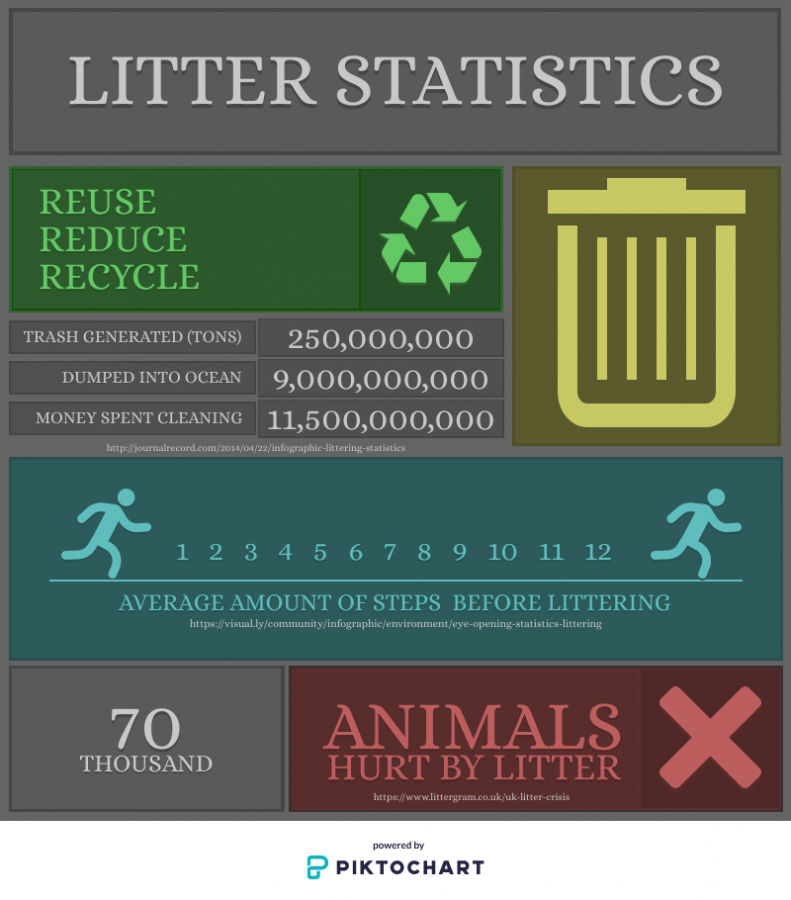Cleanliness should be maintained
How big of an issue is littering, both on campus and in the world?
By An Vo
Litter statistics that show the results of not disposing trash properly.
November 18, 2019
There is a problem with littering on and around our campus and it should be stopped. It’s not so hard to find a garbage can to dispose of your trash. Everyone must contribute by disposing of their trash properly.
Litter
Why do people litter? People may have different reasons for their wrongdoing. According to “What is Littering?” by the founder of Conserve Energy Future, the unavailability of trash containers or simply becoming too lazy to hunt for one is an obstacle to many. It would be best to be responsible and hold onto your trash until you can locate a container for the debris. Don’t resort to littering.
Littering also against the law. As mentioned in “Littering Facts and Statistics,” most people are unaware that littering is an illegal act that will result in facing charges in most localities.
According to “Hawaii’s Litter Laws,” being caught littering will result in four or more hours of community service and a fine that ranges from $100-500. It’s better to use common sense and to dispose your trash properly than to violate the rule and pay fines.
Creatures have been endangered and harmed because of littering. Animals are attracted to scattered debris which may lead to incidents such as wrapped limbs or indigestible foreign objects.

Taking the time to throw away trash or recycle materials can be a hassle. Littering is the shortcut to this problem. To avoid littering, there should be more viable ways to access trash cans/recycle bins.
Landfills
Imagine the world with more landfills than buildings. Everything would be smelly. Methane and harmful chemicals are emitted from burnt trash.
Pollution in Oceans
An article from the Washington Post titled “Hawaii’s beloved beaches are covered in huge amounts of plastic, survey finds,” states that “Plastic pollution in the oceans is a rising concern among environmentalists because of the serious harm it can cause to marine organisms. Plastic debris is frequently found tangled up in the stomachs of birds who mistook it for food or wrapped around the bodies of drowned sea turtles and other swimming animals.” In other words, trash left in open space makes animals and plants sick.
The article continues that “…plastic obviously carries no nutritional value for the animals who eat it — but certain types of plastics are also known to pick up other types of chemical contaminants in the water, making them especially toxic.”
If we don’t stop the littering epidemic, then environments such as the ocean and the air will become polluted with unwanted chemicals which will result in the endangerment of animals or society. As mentioned in “Ending the Epidemic of Littering” by Alayna Caricofe — if we continue to ignore our issues, then it will keep expanding until it becomes complex to resolve. We should take care of the epidemic as swiftly as we can so our mess doesn’t affect everyday lives.
Solutions
There are many solutions to promote cleanliness. You can organize trash so you can differentiate waste from reusuable or recyclable materials.
Separating your trash based on what they are made of is important because it reduces waste.
Although compost is a natural resource to improve the growth of plants, using a compost bin is a better choice than littering because it allows nutrients in waste to break down efficiently.
Without compost bins, there would be flies that thrive on scraps which may carry unwanted bacteria to make people sick.
The school can contribute to campus cleanliness. Our trash cans and dumpsters are often full and there’s nowhere else nearby to dispose trash. The school should purchase more garbage, recycling, and compost bins for the community.
All in all, improvements can be made within the school. We need to think more about the environment and how it impacts everyday lives by taking care of it. Everyone has the right to live in a healthy environment.

Scraps of cardboard and other debris are left unmaintained on the boundaries of the school.
To learn more ways to reduce trash, click here.
Language errors were corrected on March 01, 2020.








